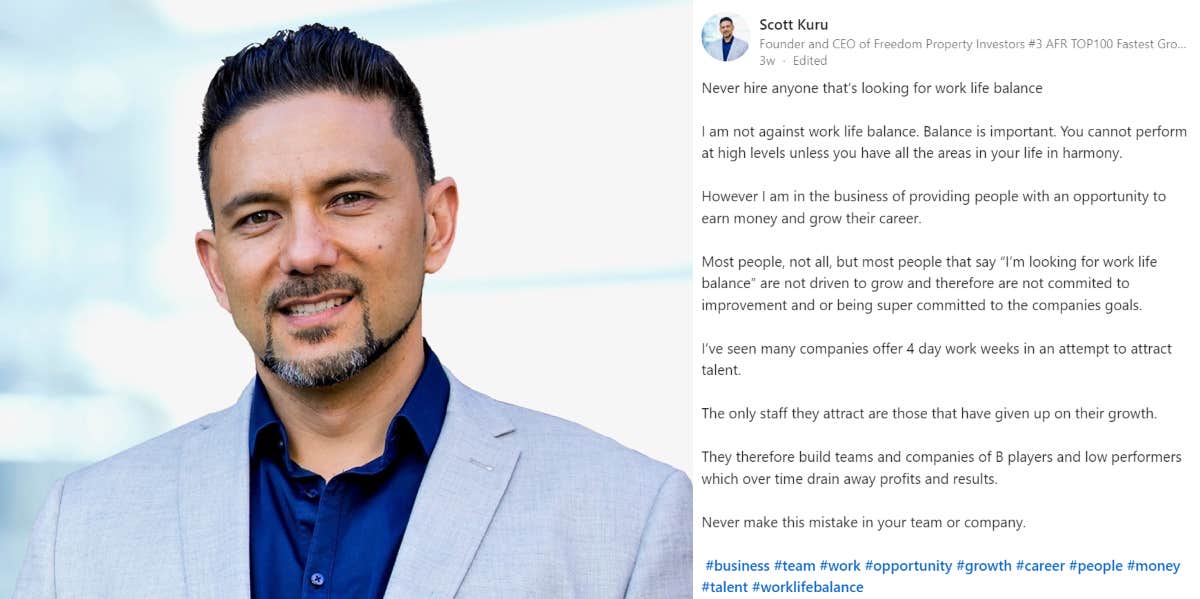CEO Pens LinkedIn Post Telling Employers To 'Never Hire Anyone That's Looking For Work-Life Balance'
He clearly can't read the room.
 Facebook / LinkedIn
Facebook / LinkedIn In today’s climate, employers have to be extremely careful of what they post online and how they choose to represent their company’s brand.
In an age of burnout and workers desperately seeking to move away from our current live-to-work culture in order to find enjoyment in their lives, one CEO is pushing back against workers' wants.
Scott Kuru, who is listed on LinkedIn as the Founder and CEO of Freedom Property Investors, recently shared his opinion about whether or not companies should hire workers who admit that they want their employer to support a healthy balance between their professional and personal lives.
Kuru told his LinkedIn followers why he disagrees with seeking a work-life balance.
Kuru starts his post with a strong stance, stating, “Never hire anyone that’s looking for work-life balance.”
He goes on to clarify that he is not entirely against it, and agrees that all aspects of a person’s life must be in harmony for them to reach their full potential.
The CEO further explains that his goal is to provide a chance for people to earn a living as they grow in their careers, and that is when his post starts to take a tone that many might disagree with.
Kuru says that most people who communicate that they need work-life balance are not looking to grow in their careers.
He also says that they are not committed to their own advancement, nor those of the company they are seeking to work for.
The founder adds, “I’ve seen many companies offer 4-day work weeks in an attempt to attract talent. The only staff they attract are those that have given up on their growth.”
“They, therefore, build teams and companies of B players and low performers which over time drain away profits and results. Never make this mistake with your team or company.”
As expected, his controversial commentary did what he likely wanted it to do — attract dissenters left and right.
The first person that commented seemed to be beside herself with disdain for the leader’s point of view.
She commented, “Well you definitely poked the bear! The well-being bear! Defining work-life balance in a virtual world has different meaning today! I do not agree with this statement! How do we think we got to 1 in 2 Americans burned out?”
“Burn out now has an ICD-10 code, a confirmed disease state with huge healthcare costs to employees and employees. It is time to reframe our approach to how we treat employees in the workplace. The downstream is going to be ugly two to three years from now!”
The floodgates were open and professionals from every corner of LinkedIn chimed in to let Kuru know that his approach was tone deaf and disheartening — rightfully so, since by now, most leaders know that people perform better when there is work-life balance.
Studies prove him to be incorrect in all of his assumptions about work-life balance.
A December 2020 study found that 76% of workers were experiencing burnout due to excessive hours and demands, resulting in a lack of downtime.
And let’s not forget the Great Resignation when 41% or 2 in 5 employees walked away from their jobs or their entire careers in search of more flexible working arrangements.
Work-life balance is more than just a catchphrase.
When it is healthy, it improves employee engagement, lowers the cost of healthcare for employers, and result in better performance.
Employees who live a balanced life work 21% harder, making them much more efficient than those who are overworked.
Lastly, Kuru seems to believe that a 4-day workweek equates to less productivity, but the opposite is true.
When excess working hours are reduced, workers are naturally happy, but the employer benefits from it with increases in individual productivity, and fewer mistakes, leading to reductions in costs.
Of course, there are challenges to shortening hours for employees.
Leadership has to figure out how to become more efficient and get the work done on reduced schedules.
Costs can also increase if employees receive the same salary for fewer hours, but most employers understand that the benefits of content and interested employees far outweigh the risks associated with burnout.
Kuru’s post and the inferences he made seem to indicate an inability to read the virtual room — how it impacts his company’s image remains to be seen.
NyRee Ausler is a writer from Seattle, Washington, and author of seven books. She covers lifestyle and entertainment and news, as well as navigating the workplace and social issues.
